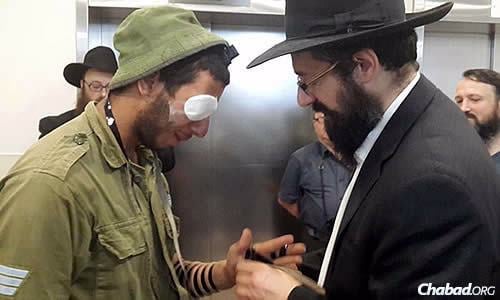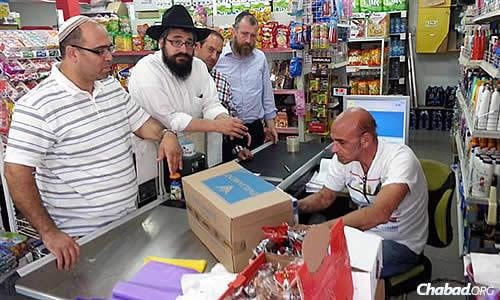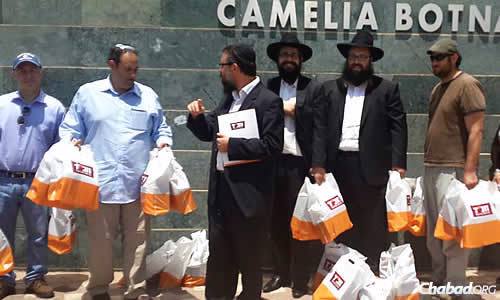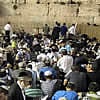At the start of “Operation Protective Edge”—Israel’s battle to rid Hamas of rockets and tunnels in the Gaza Strip that threaten the lives of people in the Jewish state—Rabbi Mendel Kaplan made an impassioned speech to his congregation.
He recalls telling those assembled at Chabad @ Flamingo in Thornhill, Ontario (which he co-directs with his wife, Faygie) that when “our brothers are at war, Jews can’t sit on the sidelines.” The rabbi acknowledges that at the time, he didn’t know where he was going with his comments; he just knew something needed to be done.
His sermon, it turned out, resonated with the local Chabad community, and people started prodding him to go with them to Israel to help in some way. Three weeks into what had become a full-fledged war in Gaza, he and a group of eight others, including Chabad Rabbi Yossi Sandhaus, boarded a plane to Israel.
Each person took with them thousands of dollars (both personal funds and money from others who couldn’t go with them), in addition to care packages assembled by a group of local women for members of the Israel Defense Forces.
“I didn’t know how we would be received or if it would be meaningful, but after the fact, I can say it was the most rewarding and enriching experience I’ve ever had in my life,” said Kaplan of the three-day mission. “People were just so literally blown away. We told them—in Hebrew—that we came to Israel not to eat, drink or tour. We came here to express our solidarity with you because we are one family and wanted to share in your difficult time of need.
“Every reaction was extraordinary,” he continued. “People were so touched; it meant so much to them.”
‘Uplifting and Inspirational’
With the help of the Chabad Terror Victims Project in Israel, the group visited injured soldiers in Soroka Hospital in Beersheva. There, they provided the wounded with items like headphones and snacks, and replaced sets of tefillin and prayerbooks lost in the field.
They also spent time with families who were sitting shiva [in mourning] for the loss of a fallen soldier, gifting each family with $1,000 to help them with their immediate needs or to memorialize their loved one.
At one home, a relative asked the rabbi: “What does it mean, you came to visit? You mean you came especially to Jerusalem?” When Kaplan replied that they were from Toronto, the relative said: “I have no words. I can never tell you how much this means to me.”

While the area near the Gaza border is closed to visitors right now, Kaplan assured that the group managed to get the care packages from home handed out to active-duty soldiers there.
“Every place we went, we worked with the local Chabad network. It is very organized,” reported Kaplan. “They guided us, as they had local information on the ground. Chabad in Israel functions in a very smooth and efficient manner.
“We were also so impressed by the work of the Chabad’s Terror Victims Project, which coordinated the visit and organized every detail. From the moment of our arrival, CTVP was there on the ground, from early morning until late at night. We couldn’t have done it without them, and special thanks go to Rabbi Menachem Kutner and Rabbi Yossi Swerdlov, who head up this incredible organization. It was amazing to see the work they do not only during the war, but every day of the year.”

The Canadians also went to towns in the south of Israel, including hard-hit Sderot, which has been under near constant shelling and bombardment from Hamas rockets. Indeed, it was a local Chabad emissary who alerted them that some families in Sderot were in desperate need of food. The group immediately went to a local market and spent several thousands of dollars on everything from staples like flour, sugar and pasta to chicken and other meats.
And they worked with the Chabad center in Sderot, which is built as a bomb shelter, to hold a pizza party for some 70 youngsters who have not been out of their homes in recent weeks, providing them with some entertainment as well.
In speaking to the children and explaining why they came, Kaplan stressed the bonds between the Jewish people by quoting a passage from Shir HaShirim, “The Song of Songs,” which says that “the greatest water can’t extinguish the love.” Despite the fact, he noted, that “we in Canada are separated from you in Israel by larger bodies of water, we are nonetheless united in ahavat Yisroel (love of a fellow Jew).”

Kaplan and his group also traveled to the southern city of Netivot to visit IDF forces, including a soldier originally from Thornhill, on a 36-hour leave from their military deployments, bringing 125 pizzas with them.
“As a shaliach,” he said upon his return to Canada, “I have dedicated my life to public service, but I can’t remember ever having three such meaningful days. It was an emotionally draining, exhausting trip, but at the same time, it was incredibly uplifting and inspirational.
“If there’s one message to take away, it’s this: I believe there has never been a more important time to visit Israel. The people of Israel are very strong, resilient and unified, but they need our support. It means the world to them that those outside of Israel are thinking about them and care about them and come to visit them.
“We went to give,” Kaplan added, “but we received so much more.”

On his return from Israel, Rabbi Kaplan appeared in a video presentation made for Jewish.tv, and talked about his experiences and the reaction of those who joined him.








Start a Discussion